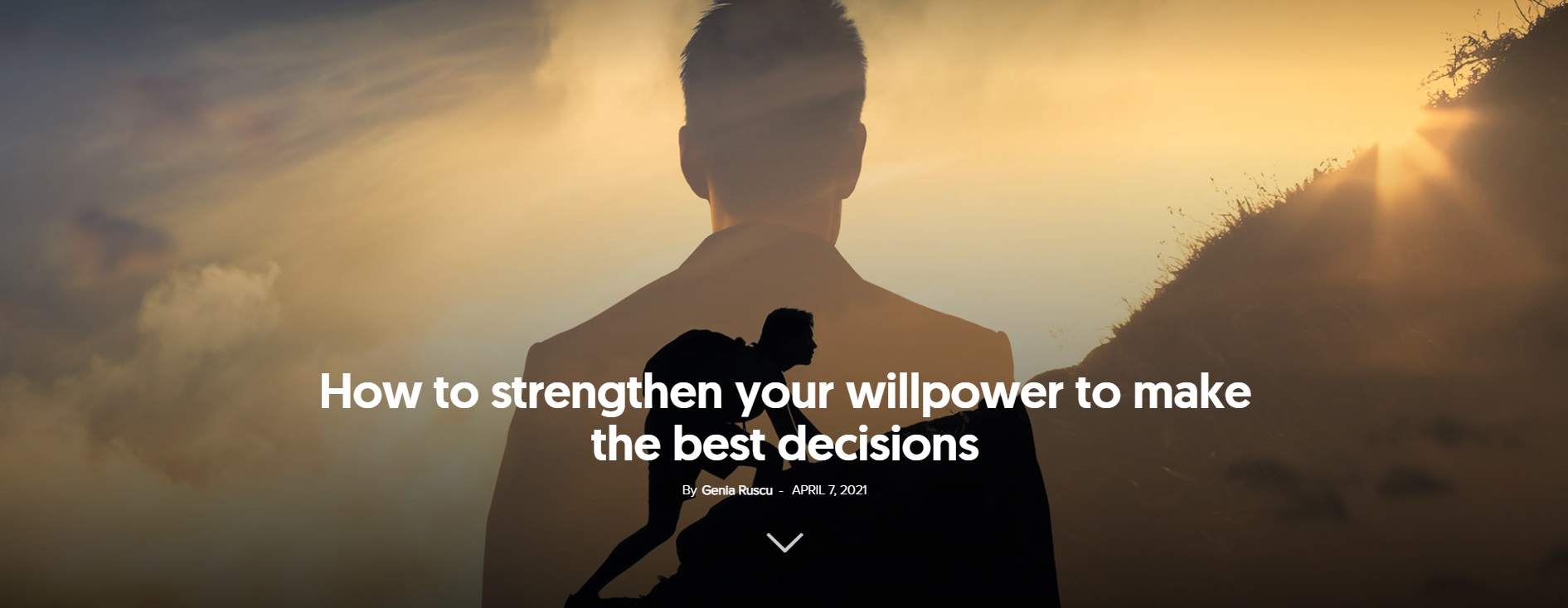Albert Einstein didn’t speak until he was 4 years old, and didn’t read until he was 7. His parents thought he was mentally disabled, and one of the teachers described him as “mentally slow, unsociable, and adrift forever in his foolish dreams.” He was expelled from school and denied admission to the Zurich Polytechnic.[1]
Success or failure cannot define us, because neither is, in itself, a characteristic of the individual. In reality, the trajectory of life often rises and falls. We alternate between successes and failures, and maintaining and consolidating a state of success involves activating all the mechanisms related to our will.
This is because the will is the general manager of life. But instead of imagining it as a button, as a blind and autonomous triggering force, the will must be understood rather as an assistant who is able to materialize our intentions and purposes that we have consciously outlined for it to execute. The will has the tools, but it does not act automatically. First, it has to be passed through the filter of thought and reason. The will intervenes in the case of complicated actions which require not only a high degree of determination, but also a complex execution.[2]
The will, a defining personality trait
Swiss psychologist Jean Piaget[3] believes that we can talk of the intervention of the will if two conditions are met: 1. A conflict between two tendencies (a single tendency does not generate a voluntary act), and 2. The two tendencies must be of unequal force, one yielding to the other. Through the act of the will, a reversal takes place: the tendency that was weaker becomes stronger, and the one that was initially stronger becomes weaker, and in the end, it will be defeated.
Our will is the self-regulation mechanism through which we manage to activate and mobilize our physical and mental energy, in order to overcome obstacles, satisfy our needs, and achieve goals.
Voluntary self-regulation, as opposed to involuntary self-regulation, is characterized by the following essential attributes: intentionality (action is always intentional), prior analysis of conditions, the relationship between reason, means, and purpose (action is the result of an evaluation of the relationship between advantages and disadvantages, and gains and losses), and effort. An action always involves a certain degree of concentration and tension, proportional to the difficulty of the obstacle. The obstacle is the central element around which the will or mechanism of voluntary self-regulation is structured and developed. As the Stoics believed, the obstacle is the way.
The structure and features of the will [4]Exercising the will involves the following phases: 1) Evaluating the reasons and setting a goal; 2) Analysis and confrontation of the reasons; 3) Deliberation, or decision making; 4) Decision execution, where the actions necessary in order to achieve the goal are carried out (these actions involve the necessary dedication to overcome possible obstacles and difficulties); 5) Evaluation of results (corrective feedback). The will is a superior form of self-regulation that expresses a way of functional organization of the personality, and highlights a number of qualities and traits, the influence of which is exerted on the whole psychological life. The most important are: strength (or power), perseverance, consistency, firmness, and independence. Depending on the difficulty of the obstacle to be overcome, the individual concentrates their energy. They use their strength (their will), which is activated both in the fight against internal obstacles—impulses, tendencies, temptations, or different kinds of problems—and external obstacles, which can be natural, physical, social, or relational. The effort required to overcome obstacles and achieve goals is constant, regardless of the obstacles and difficulties that may arise. This is possible through perseverance, which can be assessed by the number of attempts a person makes to solve a more difficult problem, or to achieve what they set out to do, despite the obstacles. Pursuing a clearly established goal takes commitment. This means the adoption of a certain ‘code of conduct’, which implies a consistency between beliefs and actions, between words and deeds. Stability in the decisions and resolutions adopted, despite others’ attempts to make you give up, is possible through firmness. If the decisions are objectively justified and correct, the firmness related to their preservation becomes a positive feature; if they are unjustified and arbitrary, refusing to change them becomes a negative trait (stubbornness). Independence expresses a person’s ability to organize and lead a life of their own, based on initiatives, decisions, and goals. |
Today’s failure, tomorrow’s success
A person can either adopt the belief that everyone in the entire universe is conspiring against them, or they can see the good things that happen to them every day. A problem becomes a problem the moment we see it as a problem—just as an opportunity becomes an opportunity the moment we look at it as an opportunity. Asked by a reporter how he felt about failing a thousand times in the process of inventing the light bulb, Thomas Edison replied, “I didn’t fail a thousand times. The lightbulb was an invention with a thousand steps.”
In terms of cost analysis, our positive attitude “costs” us as much as a negative attitude does. The energy consumed is the same. In other words, given this balance, it is worthwhile, regardless of the situation, to promote and adopt a positive attitude.
It all depends on individual choice, just as the prayer of serenity (“God, grant me the serenity to accept the things I cannot change, the courage to change the things I can, and the wisdom to know the difference”) can be read as an exhortation to either seek change, or to resign.
Knowing when to give up, and why you should give up, is an important quality. However, the more widespread tendency is to give up before you should. In every human being there are resources that remain untapped, simply because, most of the time, they are afraid to imagine that they can reach a better state of affairs. That’s because, most of the time, people get caught up in the monotony of life, becoming victims of routine, “wheels engaged in the system.” Such an attitude has the potential to kill dreams, the desire to want more from oneself, the design of a plan, and its fulfilment. In addition, there is always the risk of negative influences from the “advisors” around us, who believe that our dream is out of our reach.
Capitalizing on self-confidence, being aware of certain latent abilities, and having perseverance and motivation lead to the harnessing of an individual’s potential, and, at the same time, enable the manifestation of a winning mentally.
The impossible: closer than we thinkNick Vujicic is one of those people that life has put through terrible trials. Despite the difficulties of the life he came into—without arms and legs—Nick is famous for his motivational speeches urging people not to give up the fight, no matter the problems they face in life. Vujicic is a doubly stigmatized person: first, because of the physical disabilities that have left their mark on his emotional development, and, second, because of the harsh way people have treated him throughout the years. He was seen as a monster, and as a freak to be avoided. However, even in these conditions, he found the strength to fight, and to fulfil his dreams. |
Victory is for those who don’t give up
Success and failure are two sides of the same coin. With a new 100 dollar note, you can buy products worth 100 dollars. The same note, this time crumpled and dirty, found on the floor, is still worth 100 dollars. You can still get your money’s worth.
The same thing happens with people who have suffered failures. Their value is the same as it is during success, or before failure. At the time of failure, people are like a crumpled note, they have the same skills and abilities as before the fall. Looking beyond problems helps to find solutions, plays a part in overcoming crises, and leads to the concentration of all resources, in order to turn failure into victory. Many successful people have fought hard, especially in difficult times, when they were at their lowest.
Transitioning from crisis to victory is connected to:
- Self-confidence: No one else will trust you when you fail, but yourself.
- Understanding that failure has a good side, paradoxical as it may seem: Moments of failure are the moments when you learn about your weaknesses and your wrong choices. “If… then” models can be built, and in the future, these situations can be avoided. Any prospect of failure, even if it’s not desirable, can mean a new lesson about yourself.
- Avoiding turning failure into tragedy: No matter how serious a situation, there are certainly much greater failures. There are people who die of hunger every day, or who discover that they suffer from incurable diseases. In most cases, the comparison with the more serious crisis situations that others go through helps overcome the obstacles encountered at a given time.
- The experiences of others (who have gone through crisis): These are starting points in overcoming your own problems.
- Available resources: No matter how difficult the situation is for people, at any given time, in order to overcome difficulty, the available resources must be identified.
- The losses suffered: Being aware of them helps in the effort to regain one’s initial position.
- Perseverance and motivation to retry: The question should be, “What’s worse? Not getting up for fear of falling again, or getting up again even if I fall?”
- Finding solutions to overcome the stalemate must be followed by action: Designing the plan that leads to overcoming the moment of crisis is not enough if we don’t carry out activities that involve personal and contextual rehabilitation.
If something is important to you, you will find a solution. If not, you’ll find an excuse.
Carpe diem, but responsibly
Our consumerist society is increasingly emphasizing and ingraining the importance of material things, to the detriment of people and ideas. We are losing the ability to express our love, pain, passion, joy, longing, or sadness. Living every moment intensely means being present in everything we do. We are not present if we pour ourselves into material things.
We dream, but we don’t always fight for our dreams. Our daily routine prevents us from experimenting with new things and leads to the abandonment of the things we’re passionate about. Experimentation is essential, because it maintains optimal brain activity, and the brain is challenged to come up with new solutions to old problems, or new contexts.
At the same time, laughing and smiling must not be forgotten. Laughter and good spirits are beneficial. We must revive the joy of small things. Unhappiness grows when you favour rapid success and shallow victories instead of profound victories, which imply emotional and spiritual development. The ultimate victory involves turning to your own person (who, according to the Bible, also involves God), and seeking the inner peace necessary to build harmonious relationships with others.




















